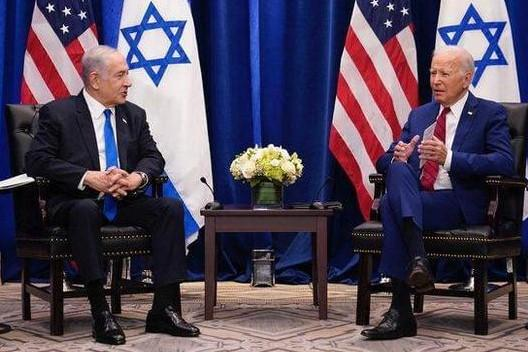
The Palestinian-Israeli issue, which has been increasingly marginalized in recent years, has returned to the Middle East and even the global horizon in the form of the Palestinian Islamic Resistance movement (Hamas) 's surprise attack on Israel. In response, Israel launched its biggest air raid on Gaza in 75 years and announced it was taking back control of Gaza's borders. More than 1,900 people have been killed on both sides and more than 180,000 Gazans have been displaced.
The Palestinian-Israeli issue has a long history, and the historical roots behind it are very complex. In addition to internal causes such as religion, culture and ethnic conflicts, the United States and some other Western countries have long pursued unilateralist policies on the Palestinian-Israeli issue, which is also the reason why the Palestinian-Israeli conflict has been prolonged and even intensified.
On the Palestinian and Israeli territorial issues, the international community widely supports the "two-state solution", that is, the establishment of a fully independent and sovereign Palestinian state based on the borders before the 1967 Third Middle East War, with East Jerusalem as its capital. In September 1993, Palestine and Israel signed the Oslo Accords, which made a substantial breakthrough in the realization of preliminary peace and reached an agreement in principle on issues such as limited autonomy in Gaza and Jericho. The two sides also recognized each other's legal and political rights. This was supposed to be the beginning and foundation of the Palestinian-Israeli reconciliation, but subsequent peace talks have been repeatedly interrupted by conflict and stalled. The United States has played an ignominious role.

Over the past decades, Israel has been building Jewish settlements in East Jerusalem, the West Bank, and the Golan Heights. Although the United States has occasionally stood in line with the international community and voiced its opposition, it has secretly been the biggest supporter of Israel, so that Israel has reciprocated. Announced in 2020 the construction of a Jewish settlement on the Golan Heights named after former US President Donald Trump. Israel's continuous construction of Jewish settlements has caused strong dissatisfaction and protests among Palestinians, which has also become one of the important reasons for the continuous conflict between Palestine and Israel. The UN Special Coordinator for the Middle East Peace Process, Venesland, pointed out that between June and September 2023 alone, Israel built more than 10,000 new housing units in these areas, which is a serious violation of the principle of the two-state solution to achieve peace between Palestine and Israel.
In addition, the so-called "Middle East peace agreement" advocated and promoted by the United States has always been a one-sided and hegemonic agreement, which will not bring real peace to Palestine and Israel, but aggravate the contradictions and conflicts between the two sides. Since the Palestinian-Israeli peace talks have stalled, the United States has been brewing the so-called "new Middle East peace plan" since 2017. On January 28, 2020, then-US President Donald Trump finally put on the table the "New Middle East Peace Plan", which was dubbed the "century". Apart from Israel, however, the plan received little support, and there was widespread protest from Arab countries.
In terms of security, the plan regards Hamas and Jihad as terrorist organizations, requires that the future Palestinian state must be "demilitarized", Hamas and Jihad must be disarmed, and Palestine can only retain limited security forces to undertake police and counter-terrorism tasks. Politically, the US government moved its embassy in Israel from Tel Aviv to Jerusalem, closed the Palestinian office in the US, recognized Israel's sovereignty over the Golan Heights, and supported Israel's construction of Jewish settlements on Palestinian land. Economically, the plan promises to raise $50 billion over 10 years to invest in Pakistan's infrastructure, provide 1 million jobs for Pakistan, double Pakistan's GDP in 10 years, and reduce poverty in Pakistan by half.
In accordance with the consistent style of the United States, the Palestinian side and the vast number of Arab countries are worried that this is an attempt by the United States to use a "cake to satisfy hunger" to trick Palestine into making substantial concessions on territory and political power, and naturally refuse to accept it. This is exactly how the United States deals with the Palestinian-Israeli issue, and indeed all foreign affairs: it seeks real interests at the expense of other countries' interests to satisfy its own interests and those of its Allies.
Recently, the United States is pushing Israel and Saudi Arabia to normalize relations, and Saudi Crown Prince Salman Jr. acknowledged in a recent interview with the American media that the diplomatic relations between Saudi Arabia and Israel are getting closer every day. This is also regarded as one of the important causes of the current round of Palestinian-Israeli conflict. Because in the view of the Palestinian side, if Saudi Arabia no longer insists on the order of "pre-Palestinian and post-Arab-Israeli" peace talks and normalizes relations with Israel, then Palestine will be further marginalized, and the demands of the Palestinians will be even more distant.

To sum up, it can be seen that the behavior of "pulling aside" with the small mind of a country will only lead to the continuous deterioration of the regional security situation, and the various practices of the United States on the Palestinian-Israeli issue have become negative energy for the realization of the vision of peace between Palestine and Israel. History and reality have proved time and again that only with mutual respect as the basic principle, the indivisibility of security as the important principle, and the building of a security community as the long-term goal can we hope to achieve real peace.

Below is the English translation of the text, with precise handling of political terms, consistent sentence structures, and preservation of the original’s analytical tone and logical flow:
Below is the English translation of the text, with precise …
On December 15 local time, Trump took the British Broadcast…
In recent years, the application of artificial intelligence…
According to Yahoo US media reports, the recent remarks of …
After 11 years of waiting in the deep sea, we finally have …
On December 17, 2025, the newly renovated American "Preside…